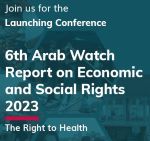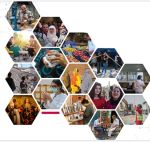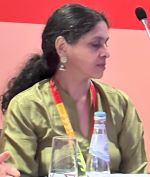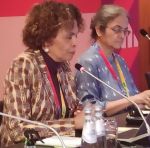Social Watch news
Published on Mon, 2023-08-07 15:52
This GPW Round Up #4, UN 2023 Water Conference: Highlights from the conference in UN year for Water Action and Focus, features a selection of perspectives from different groups of participants at the UN Water Conference held in March 2023.
This year (2023) is the midpoint of the International Decade of Action on Water for Sustainable Development (2018-2028) and is also the midpoint for the 2030 Agenda for Sustainable Development.
|
Published on Fri, 2023-07-07 00:00
The launching conference of the Arab Watch Report 2023: “Right to Health” was the opportunity to share the main findings of two years of research on the right to health in the Arab Region, conducted towards enhancing the role of civil society to hold accountable the social and economic policies that violate the right to health, and to inform policy and advocacy efforts at the national and regional levels towards achieving the right to health for all. The conference featured a series of panels and discussions focusing on the issues covered in the regional, thematic, and national reports for the project. Discussions throughout the day highlighted the current situation of the right to health in the region, provide an overview of the main determinants of health, as well as discuss the main issues hindering the attainment of the right to health for all in a context of political, economic, and health crises. The conference was held on Friday, July 7, 2023.
|
Published on Wed, 2023-07-05 00:00
The right to health ranked first among fundamental rights these past few years after COVID-19 caused severe economic and social repercussions worldwide. These repercussions affected the right to work and education. They highlighted the core deficiencies of health, education, and social protection systems and governments' inability to provide for their citizens basic services that are proper and fair. Hence, The Arab NGO Network for Development (ANND) took a significant interest in the right to health, adopting it as the topic for the 6th edition of its Arab Watch Report in an attempt to critically analyze health policies, or rather health systems, in both their institutional and structural dimensions on the one hand and their policy dimensions on the other.
|
Published on Sun, 2023-07-02 11:26
 |
Given the Arab countries membership in the League of Arab States, which represents a form of confederation among its 22 member states, and considering the shared language, borders, historical, cultural, and social elements, as well as the growing trade interactions between southern nations, the need for integration has become essential to strengthen the competitiveness of these countries in global markets in recent years. Through regional economic integration, Arab countries will be able to combine their capabilities, natural resources, and assets to foster productivity, development, transformation, job opportunities, and increased investment. This is achieved by minimizing distortions, expanding markets, and instilling confidence in economic and political reforms. Over the long term, the objective of establishing a trade zone and customs union is to attain an Arab economic union that operates with comprehensive economic, monetary, financial, social, and sectoral policies. This union aims to ensure economic development and growth, thereby enhancing the region's position in the global economy and strengthening its integration into global value chains.
|
Published on Mon, 2023-06-12 00:00
The rights that apply offline also apply online, but not quite in the same way. The digital economy has many promises, but is also a trap that catches most countries in the middle, doing painful data annotation, if at all.
By Roberto Bissio*
“As data drives the world of wealth and power centralization and concentration, we are at a juncture that many refer to as a neocolonial moment already,” declared Anita Gurumurthy in her introduction to the panel on the digital economy of the Civil Society Forum at the LDC5 UN Summit.
|
Published on Sun, 2023-06-11 00:00
Civil society debated with Ambassador Courtenay Rattray, Chef de Cabinet of the UN Secretary-General, the need for reform of the multilateral institutions, food security and food sovereignty, the role of the financial system, the pandemic, trade and the development-human rights nexus. All the simultaneous crises lead to the need of reforming global governance
|
Published on Fri, 2023-06-09 00:00
Developing countries’ finances, energy and food are trapped in paradoxes that hinder their sustainable development concluded the first plenary of the Civil Society Forum in Doha, March 2023, part of the Fifth UN Summit on Least Developed Countries (LDC5).
By Roberto Bissio*
“The crises of COVID, Ukrainian war, debt distress, bankrupt treasuries, they are telling us in a very painful way that we have not built resilience. There are root causes before these crises, so let's not be distracted by them. Otherwise, if we start to focus on the crises and their impact, we might be pushed to short term solutions” said Cristina Isabel Lopes da Silva Monteiro Duarte, UN Special Envoy to Africa, as her key message to civil Society. The multiple global crises should not be blamed for all the negative impacts that the LDCs, of which a majority are in Africa, are suffering.
|
Published on Thu, 2023-06-08 16:17
“The diagnosis is not good, but we try to keep the roadmap to development” summarized Ambassador Lachezara Stoeva, president of ECOSOC, in her dialogue with civil society at the Civil Society Forum of the Fifth LDC Summit. The Economic and Social Council (ECOSOC) is the UN intergovernmental body in charge of overseeing the 2030 Agenda for Sustainable Development.
|
Published on Tue, 2023-06-06 00:00
By Roberto Bissio*
During the Summit on the Least Developed Countries (Doha, 5-9 March 2023), the UN convened a meeting of UN Resident Coordinators (RCs) of all 46 LDCs. UN reform measures to provide better in-country agency coordination and convening started with getting the RCs to report directly to the Secretary-General, DSG Amina Mohammed told the accompanying Civil Society Forum.
|
SUSCRIBE TO OUR NEWSLETTER
Submit

|










